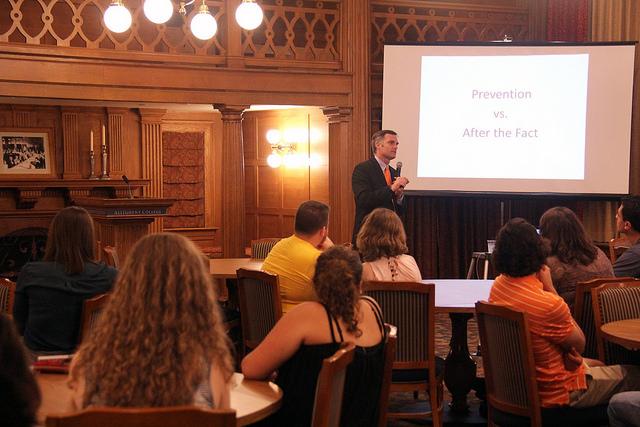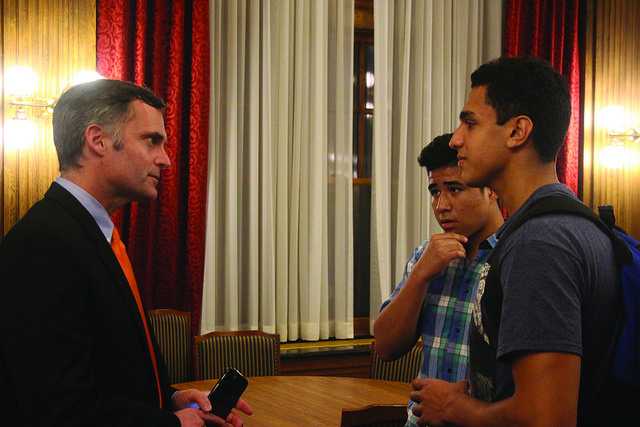Former White House official speaks on the importance, difficulties of federal budgeting
Darrell Park, ’91, speaks with George Castellon Castillo, ’20, and Hamza Masaeed, ’20, after delivering his lecture on the politics of federal budgeting on Friday, Sept. 9, 2016. Park offered to work individually with students through a short course he is currently offering at the college.
Darrell Park, a 1991 Allegheny graduate who worked in the White House during the Bill Clinton and George W. Bush administrations, returned to campus Friday, Sept. 9, to give a lecture and presentation on the federal budget.
Park worked in the Office of Management and Budget, balancing the nation’s budget. He has also started numerous tech companies and is currently a candidate for supervisor of the Fifth District of Los Angeles County.
Park began his presentation by explaining that he hoped to be of some help to each of the students in attendance.
Past speakers for the Lunchtime Learning series focused on their companies and the process of applying to internships. Park, however, took a more personal approach.
“I want you to get out of your comfort zones,” Park said. “Forget about money for a second. What really inspires you? What makes you happy?”
The auditorium fell silent. Ashley Leonard, ’20, mentioned she wanted to start her own construction business, while Arman Dashti, ’18, said he would like to start a fund in order to help students afford higher education.
“It’s easy to take what we have for granted, and it is difficult to do anything meaningful without a bachelor’s degree,” said Dashti.
Park went on to mention that in students’ careers, they must be able to make a “pivot,” in which they can shift directions from their original plan. He urged the audience to not make the same mistake he did by not learning the principles of fundraising and equity.

Darrell Park, ’91, delivers a lecture on the difficulties of the federal budget on Friday, Sept. 9, 2016. Park presented this lecture as part of a political science short course entitled “Managing Priorities and Politics in the Budgeting Process.” Park’s lecture is one of several meetings in the short course, including a workshop on budgeting. The short course is part of Allegheny’s new Law and Policy program.
He mentioned that with the ability to raise money, anything is possible in business. He urged students to get involved with charitable organizations within the Meadville Community as well as the fundraising department at the college.
“[Internships don’t] have to be a three month long summer internship,” Park said. “You can volunteer for a few hours a week at a food shelter or the fundraising center at the college. It won’t appear on paper, but the skills you will gain will help you in the future.”
In Tippie Alumni Center on Friday, Sept. 9, Park also spoke to students about the politics of the federal budget. While working for the White House, Park helped to balance the budget, and often spoke from personal experience.
Park said many Americans are ignorant about a topic he believes is important.
“Right now, the vast majority of us have no clue how our tax dollars are spent,” Park said.
Park also said deviations from typical budget processes, where the president proposes a budget and Congress negotiates on it, have created confusion.
“Nobody knows what’s actually happening,” Park said.
Putting a picture of an F-22 fighter plane on the projector, Park brought up the point of how much money is spent on unnecessary projects. The F-22 project has cost around $62 billion.
“I’m not anti-military,” he said. “I am pro-good choices.”
Park said he feels there are better things to spend money on that we currently do not. He pointed out that imprisoning a single person costs $75,000 each year.
“Prison costs more than the most expensive university in the country,” Park said.
In addition to the cost, Park said the prison system which the country has created is one in which we want to punish, not rehabilitate. He said he feels there are better things that money can be spent on.
While Park admitted the system is difficult to enact change in, he told the assembled students and faculty they are not powerless and they do have the power to change what their future holds.
Shannon Mattiace, chair of the Political Science Department, said having Park on campus was beneficial to everyone, given the topic on which he spoke.
Brian Harward, chair for the Center for Political Participation, said public discussion was a small part of Park’s interaction with Allegheny students. Harward said most of Park’s interaction was with 15 students from Allegheny’s Law and Policy Program.
“He’s going to meet with them over a period of two days to give a public lecture on [the] politics of federal budgeting, and then he’s going to do a workshop with our students for all day Saturday,” Harward said.
According to its website, the Law and Policy Program at Allegheny College is “a concentration that blends students’ academic goals and preparation in international and domestic law and policy with on-going opportunities in career education, internships, study away, civic learning, and community programming.”
Students in the program receive a concentration in Law and Policy upon reception of 120 “points.” Points are earned through completing different activities and documenting reflections of their experiences in a portfolio.
“It’s not part of the curricular structure, though it is something that students can add to their curricular interests,” Harward said.








